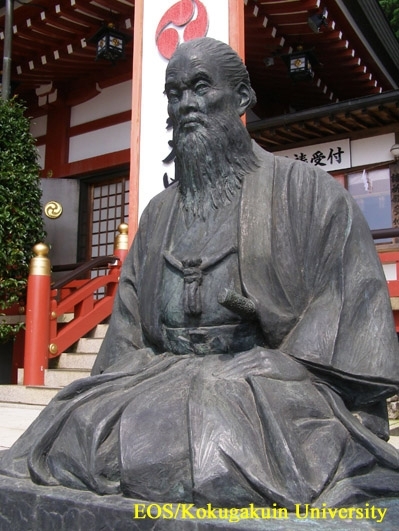- トップ
- Encyclopedia of Shinto
- Gonda Naosuke
Encyclopedia of Shinto
| Main Menu: | |
| Links: |
詳細表示 (Complete Article)
| カテゴリー1: | 8. Schools, Groups, and Personalities |
|---|---|
| カテゴリー2: | Personalities |
| Title | Gonda Naosuke |
| Text | (189-87) Late-Tokugawa and early Meiji-era scholar of Hirata Atsutane's school of National Learning (kokugaku). Born in 1809 in Iruma District in the province of Musashi (present-day Saitama Prefecture) as the son of physician Gonda Naonori. At the age of nineteen, Naosuke moved to Edo where he studied medicine under the shogunal physician Noma Kōshun'in, and Confucianism under Asaka Shigenobu (aka. Asaka Gonsai, 1791-1861), after which he returned to his home village to work as a physician. Gonda became a student of Hirata Atsutane in 1837, and became an advocate of the Shinto-based methods of traditional "Ancient Japanese Court Medicine" (kōchō koidō). In 1862, he returned to Edo to volunteer his services to the "revere the Emperor, expel the barbarian" (sonnō jōi) movement. In 1867, swept up in the zeal of Saigō Takamori's movement, he joined figures such as Sagara Sōzō in setting fire to the Satsuma domain's Edo residence. After serving as a Criminal Inspector (keihōkan kansatsushi) for the Meiji government in 1869, he became Associate Professor of the University (daigaku chūhakushi) and Special Consultant of Medicine (idō goyōgakari), but was caught up in a dispute between the kokugaku and Chinese studies factions in the university system. As a result, he was charged with crimes against the State in the third month of 1871. He was arrested, along with Yano Harumichi and Maruyama Sakura, and imprisoned briefly in the Kanazawa domain residence. In 1873, he became head priest (shikan) of the shrine Ōyama Afuri Jinja in Sagami Province (present-day Kanagawa Prefecture), and in 1882 became Professor at the Research Institute for the Japanese Classics (Kōten Kōkyūjo). He died June 8, 1887, at the age of seventy-nine. His major writings include medical treatises such as Koidō enkakukō (Thoughts on the Development of Ancient Medicine), the philological treatise Kotoba no masumi kagami (Words of the Mirror of Masumi), and the study of Shinto known as Mitama no fuyu. - Takeda Hideaki |




